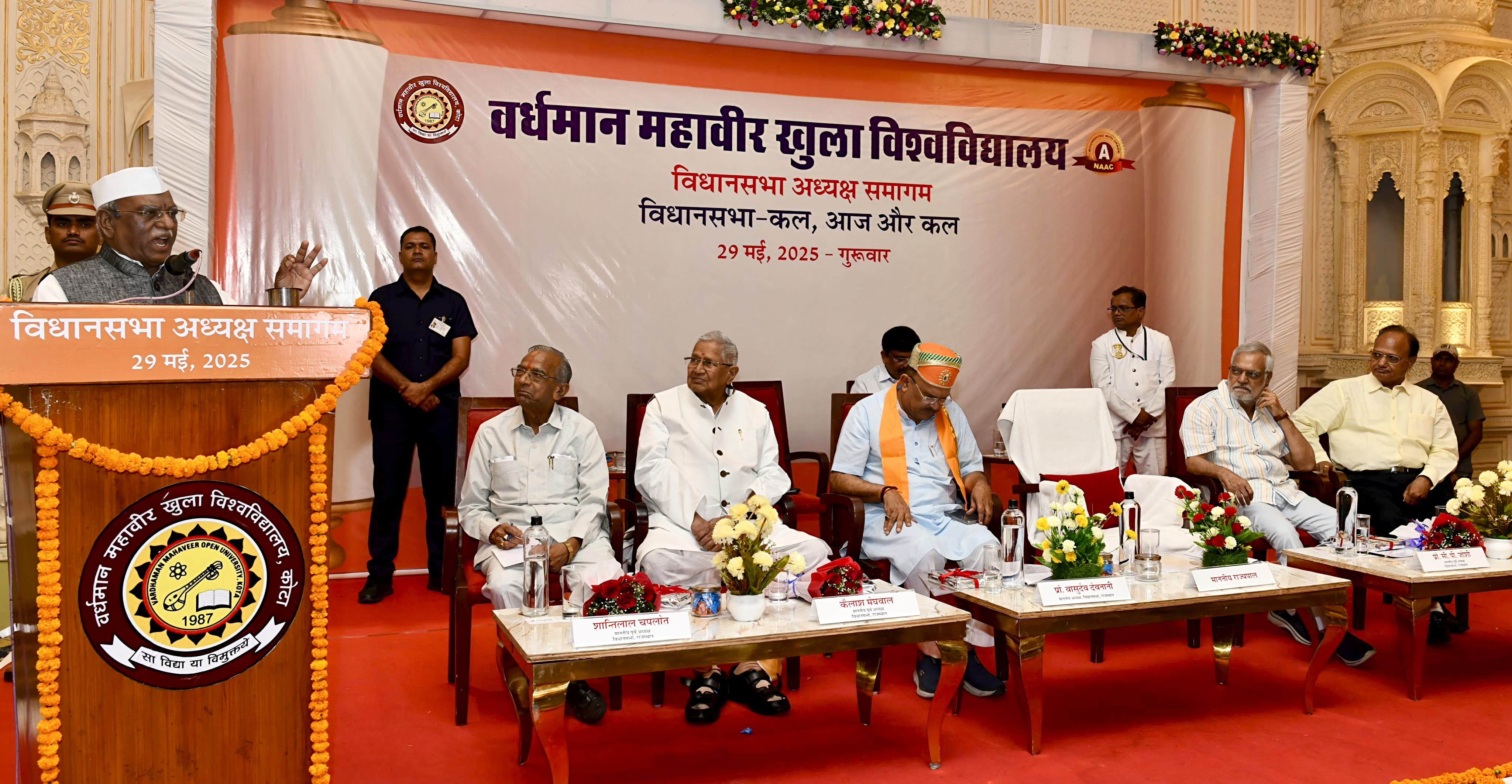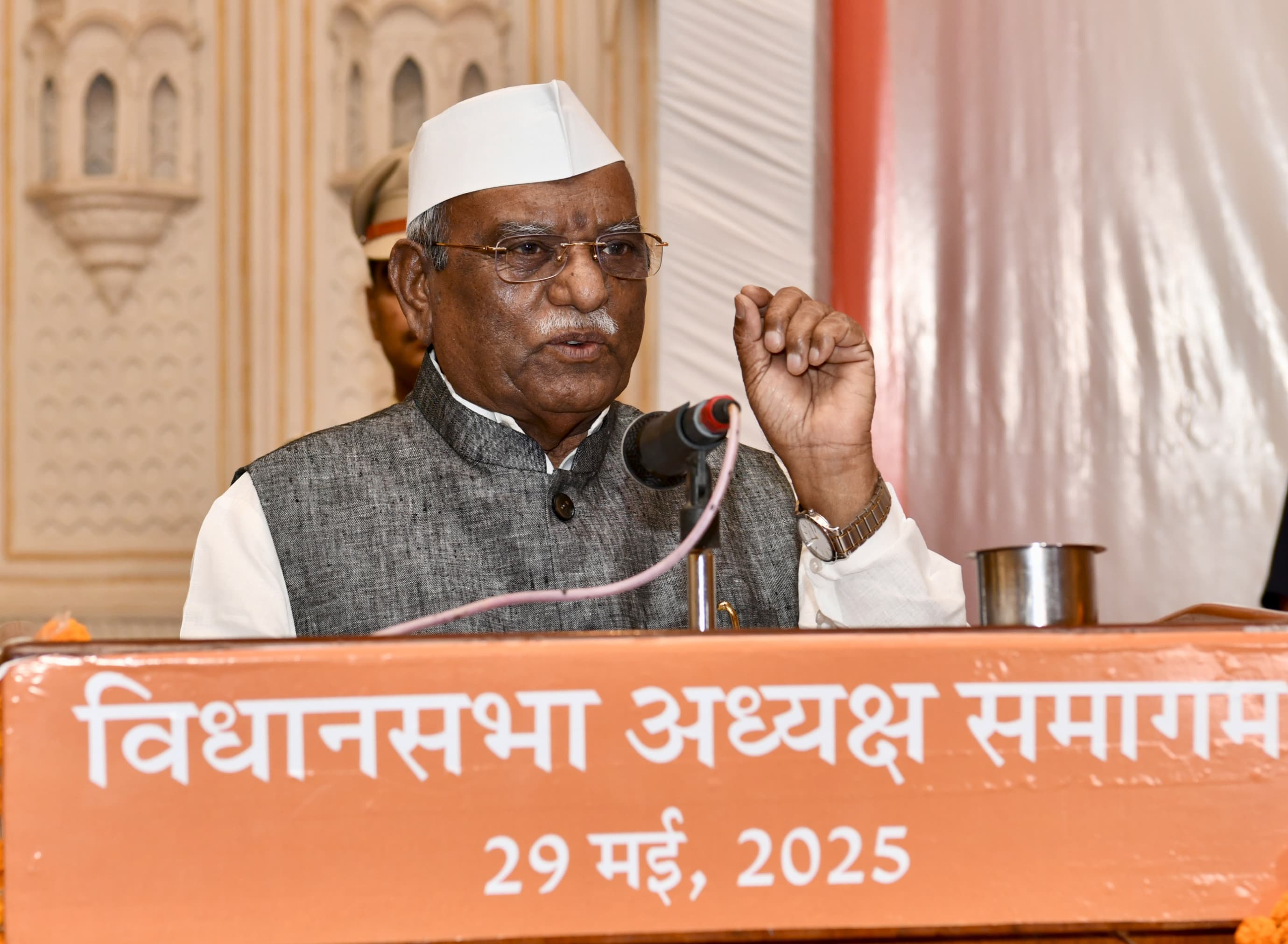
Udaipur, Governor Shri Haribhau Kisanrao Bagde emphasized that India’s parliamentary democracy rests on strong foundations. While there may have been a decline in decorum, the richness of Indian values and culture continues to ensure the dignity and sustainability of democratic traditions.
He was addressing the Assembly: Past, Present, and Future Mewar-centric Speaker Conclave held at Hotel Radisson Blu, organized under the aegis of Vardhman Mahaveer Open University, Kota. The event was presided over by Rajasthan Assembly Speaker Shri Vasudev Devnani. Former Speakers Shri Kailash Meghwal, Shri Shantilal Chaplot, and Dr. C.P. Joshi graced the dais as special guests.

Governor Bagde noted a shift from issue-based discussions in the House to more frequent digressions. He expressed concern that legislators show diminished interest in factual debates on bills, and mutual respect among leaders of different ideologies has declined. Drawing from his own experience as Speaker of the Maharashtra Assembly, he said the ultimate goal for all public representatives must remain public welfare, despite ideological differences.
Praising Rajasthan, the Governor said that the state’s Assembly functions excellently due to the disciplined and cultured nature of its people, who possess a deep faith in spiritual values. Since legislators are a reflection of society, the Assembly is well-conducted and will remain so in the future.
At the event’s commencement, dignitaries were welcomed by VMOU Vice Chancellor Dr. Kailash Sodani. Notables in attendance included Udaipur MLA Tarachand Jain, Rural MLA Phool Singh Meena, MPUAT Vice Chancellor Dr. Ajit Karnatak, JRNRV Vice Chancellor Dr. S.S. Sarangdevot, and former VC Dr. I.V. Trivedi, alongside many scholars from the academic world. A vote of thanks was delivered by Dr. Rashmi Bohra, Director of VMOU's Regional Study Centre.
Rajasthan Assembly Among Nation’s Finest – Shri Devnani
Presiding over the workshop, Assembly Speaker Shri Vasudev Devnani asserted that Rajasthan’s Assembly stands among the best in India. Its proceedings are now accessible to 80 million citizens via YouTube, enhancing transparency and improving the behavior of legislators. The Assembly is moving towards a paperless system—more than 70% of MLAs have adopted digital practices using iPads, with complete adoption targeted for upcoming sessions.
Highlighting the transformation from monarchy to democracy, Shri Devnani said successive governments have worked with public welfare as a central aim. While mutual respect between opposition and ruling members was once standard, that spirit has declined, affecting legislative work and public expectations. He called attention to a reduced inclination among legislators for research and study and urged for systematic training post-election to instill the values and conduct expected within the Assembly.
Discipline Needs Firmness in the House
He stressed that for maintaining discipline, the presiding officer must act firmly. However, he added, challenging the authority of the Chair is inappropriate. He compared the Chair to a mother—who may sternly send a child away in frustration but cannot eat until the child returns—emphasizing the familial bond within the Assembly.
Healthy Debate Must Accompany Lawmaking – Shri Meghwal
Former Speaker Shri Kailash Meghwal noted the decline in healthy debate and library use in the Assembly, which has turned lawmaking into a mere formality. He said legislation must be passed after informed and inclusive discussions to ensure broader acceptance. He called for national-level dialogue on this matter.
Focus Must Shift Back to Legislative Work – Shri Chaplot
Shri Shantilal Chaplot reminded that democratic traditions in India date back to ancient times, citing the eras of Lord Ram and Lord Rishabhdev. He lamented the fall in legislative standards and increase in corruption among representatives. Advocating for a bicameral system in Rajasthan, he suggested that experts from fields like art and education should be part of the legislative process via a Legislative Council.
Ideologies May Differ, but Public Welfare Must Prevail – Dr. C.P. Joshi
Dr. C.P. Joshi began with the Preamble of the Indian Constitution, stating that its essence forms the spirit of parliamentary democracy. While all governments have strived for justice and secularism, growing ideological divides today are concerning. He expressed hope that the future would restore public welfare and constitutional principles to their rightful place.